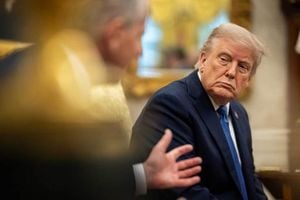On Thursday evening, Hamburg became the epicenter of political tension as Alice Weidel, the leader of the far-right Alternative for Germany (AfD), prepared to address supporters at the city's historic town hall. This engagement was met with fierce opposition from thousands of demonstrators organized under the Hamburg Alliance Against the Right, solidifying the event as not just another political rally, but also as a battleground of ideals.
The protests were slated to begin at 5 p.m. at the main railway station, Hamburg Hauptbahnhof, and were expected to draw significant crowds, with estimates rising to 17,500 participants, as reported by police. The demonstrators were set to march from the railway station along Kirchenallee, through Mönckebergstraße, before culminating their demonstration at the town hall, where Weidel was scheduled to speak at 7 p.m.
This aggression from protestors stems from Weidel's recent controversial statements during the AfD party congress held in Riesa, where many perceived her rhetoric as increasingly alarmist and divisive. Felix Krebs from the Hamburg Alliance summarized the sentiment, stating, "Last year, 180,000 people demonstrated against vague plans for deportations by the AfD, which have now been explicitly endorsed by Weidel as policy." He stressed the necessity for citizens to not merely express outrage but to take action against such ideologies.
With high emotions and stakes, the Hamburg police implemented substantial security measures, preparing for any possible escalation. They established strict barricades around the town hall, deploying water cannons and over 1,500 officers from various federal jurisdictions, underscoring the potential volatility of the event. Police spokesperson Patrick Schlüse expressed confidence, stating, "We anticipate a peaceful event, but we are well-prepared for disturbances, should they arise."
Anticipation mounted as Weidel herself chimed in from social media, casually mentioning, "I wore this heart-patterned sweater just for Antifa," capturing the attention of supporters and detractors alike. This playful dismissal of her protest foes did little to ease tensions, instead intensifying the divide.
Political leaders took to social media to voice their objections to Weidel's appearance. Hamburg's Mayor Peter Tschentscher (SPD) subtly criticized her visit, saying, "Sometimes, one may encounter uninvited guests at the town hall. But our democracy is strong and resilient." This comment reverberated through the local political stratum, prompting responses from various factions. Dennis Thering, Chairman of the CDU, labeled Weidel's presence as shameful and explicitly denounced her message, emphasizing, "Those who sow hate should not be surprised by the reaction they incite."
Additional support for the protests emerged from numerous organizations, civil society groups, and political parties including the Left Party, the DGB (German Trade Union Confederation), and the Islamic Community Council, united under the slogan "All Against Alice Weidel and the AfD." The success of these mobilizations highlighted not only the organizational clout of the opposition but also public sentiment against far-right ideologies.
Demonstrators showcased their solidarity through banners and chants, with slogans like "All of Hamburg hates the AfD" echoing through city streets as they moved toward the town hall. The atmosphere, charged with determination, was imbued with personal stories and collective memories of opposition to far-right politics, symbolizing the community’s resolve to confront extremism.
Given previous altercations at similar AfD events, the Hamburg police remained vigilant. Past incidents, including confrontations during Gauland's visit, ingrained caution within the force, leading them to expect potential attempts to breach the barriers set around the town hall. These events have historically resulted in confrontations, reinforcing public safety concerns amid the political polarization.
Meanwhile, Ahoy Radio, aligning with protest objectives, broadcasted the song "Schrei nach Liebe" (Scream for Love) by Die Ärzte for one hour to bolster the culture of resistance against the AfD’s narrative. This move underscored the creative tactics employed among dissenters to channel their discontents and unify their message.
By the end of the day, it was clear—the significance of Weidel's visit extends beyond mere political maneuvering. It mirrors the societal struggle over the future of political discourse within Germany and how communities choose to respond to rising extremism.
Looking beyond Hamburg, the visit's ramifications could foreshadow the party’s strategies leading up to the upcoming 2025 Bundestag elections. Observers note this growing polarization signifies not only electoral challenges but also broader societal shifts as communities grapple with the fringes of political ideology.



